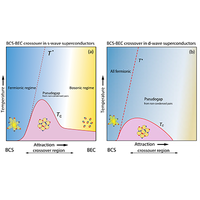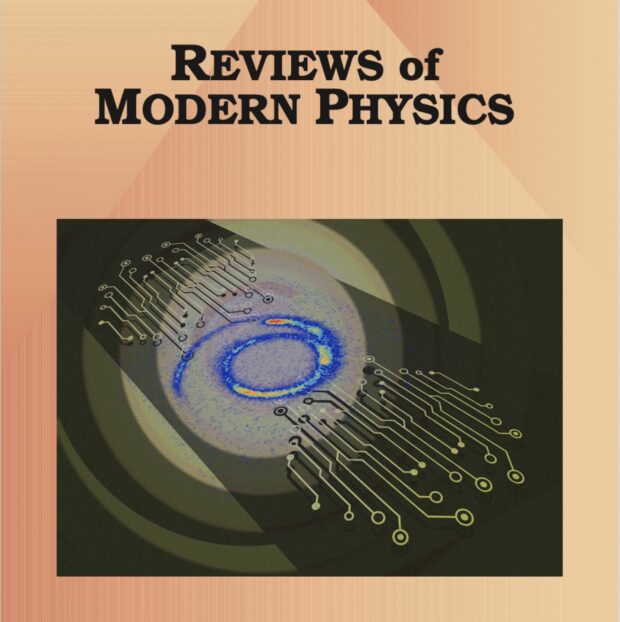当超导电性发生交叉:从 BCS 到 BEC
IF 44.8
1区 物理与天体物理
Q1 PHYSICS, MULTIDISCIPLINARY
引用次数: 0
摘要
超导领域的新进展,特别是通过意想不到的、往往是令人惊讶的超导材料形式取得的新进展,不断激发着社会各界的兴趣和理论的发展。现在人们逐渐清楚地认识到,超导有两个不同的平台:天然材料和合成材料。在过去的十多年里,随着在人工异质结构中发现新形式的超流以及对近位化的利用,对这些人工材料的研究得到了极大的扩展。天然超导体通过基于铁的锑化物、镓化物、镍酸盐以及其他材料继续给人们带来惊喜。这篇综述从两个方面对这类超导体进行了研究,重点是那些介于巴丁-库珀-施里弗(BCS)和玻色-爱因斯坦凝聚(BEC)体系之间的超导体。这种 "交叉 "超导电性的性质,有别于原子费米气体中的交叉超流,是这里的重点。在具体实验实现的背景下,探讨了促进一个系统脱离 BCS 并进入 BCS-BEC 交叉体系的多种方法。这些方法涉及天然材料(如有机导体)、人工材料(主要是二维材料)(如魔角扭曲双层和三层石墨烯)或门控设备,以及单层和界面超导薄膜。这些发展应被视为对 BCS 理论的庆祝,因为现在很清楚,尽管这一理论最初是在考虑弱相关的特殊情况下实现的,但它可以以一种自然的方式扩展到处理这些更奇特的强相关超导体的情况。本文章由计算机程序翻译,如有差异,请以英文原文为准。

When superconductivity crosses over: From BCS to BEC
New developments in superconductivity, particularly through unexpected and often surprising forms of superconducting materials, continue to excite the community and stimulate theory. It is now becoming clear that there are two distinct platforms for superconductivity: natural and synthetic materials. The study of these artificial materials has greatly expanded in the past decade or so, with the discoveries of new forms of superfluidity in artificial heterostructures and the exploitation of proximitization. Natural superconductors continue to surprise through Fe-based pnictides and chalcogenides, and nickelates as well as others. This review presents a two-pronged investigation into such superconductors, with an emphasis on those that have come to be understood to belong somewhere between the Bardeen-Cooper-Schrieffer (BCS) and Bose-Einstein condensation (BEC) regimes. The nature of this “crossover” superconductivity, which is to be distinguished from crossover superfluidity in atomic Fermi gases, is a focus here. Multiple ways of promoting a system out of the BCS and into the BCS-BEC crossover regime are addressed in the context of concrete experimental realizations. These involve natural materials, such as organic conductors, as well as artificial, mostly two-dimensional materials, such as magic-angle twisted bilayer and trilayer graphene, or gate-controlled devices, as well as one-layer and interfacial superconducting films. Such developments should be viewed as a celebration of BCS theory, as it is now clear that, even though this theory was initially implemented with the special case of weak correlations in mind, it can be extended in a natural way to treat the case of these more exotic strongly correlated superconductors.
求助全文
通过发布文献求助,成功后即可免费获取论文全文。
去求助
来源期刊

Reviews of Modern Physics
物理-物理:综合
CiteScore
76.20
自引率
0.70%
发文量
30
期刊介绍:
Reviews of Modern Physics (RMP) stands as the world's foremost physics review journal and is the most extensively cited publication within the Physical Review collection. Authored by leading international researchers, RMP's comprehensive essays offer exceptional coverage of a topic, providing context and background for contemporary research trends. Since 1929, RMP has served as an unparalleled platform for authoritative review papers across all physics domains. The journal publishes two types of essays: Reviews and Colloquia. Review articles deliver the present state of a given topic, including historical context, a critical synthesis of research progress, and a summary of potential future developments.
 求助内容:
求助内容: 应助结果提醒方式:
应助结果提醒方式:


